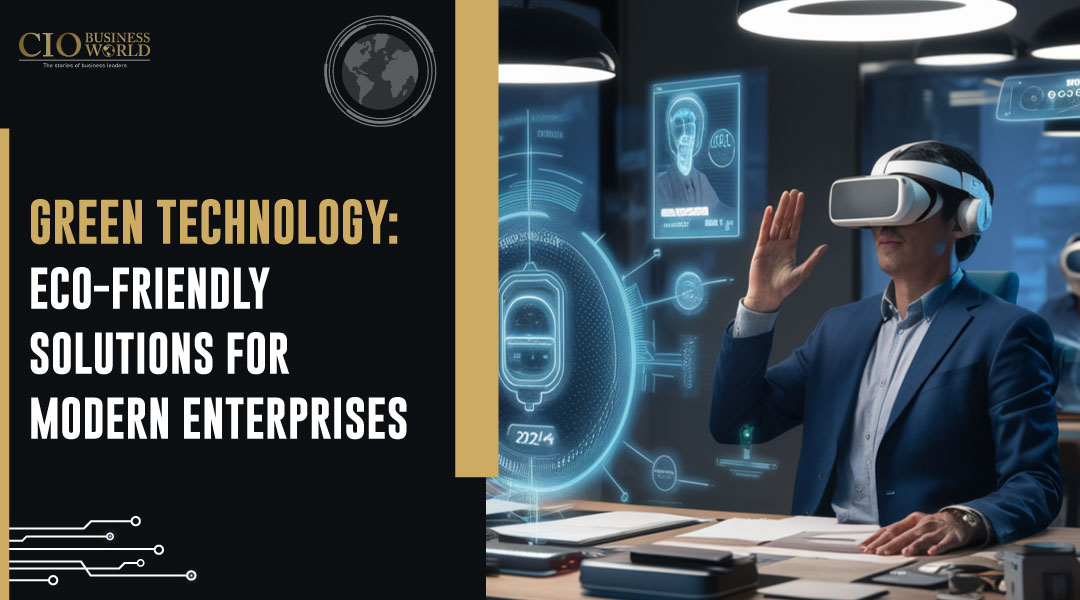Businesses today are under increasing pressure to implement sustainable practices. Green technology helps modern businesses to reduce their environmental effect while acquiring economic rewards. This CIO Business World article goes into several eco-friendly solutions, the importance of green technology, and future trends that can help organizations prosper sustainably.
The Importance of Green Technology for Modern Enterprises
Environmental Benefits
Green technology is important for reducing environmental damage. Businesses are able to significantly decrease their carbon footprint by changing to renewable energy sources such as solar, wind, and geothermal. Additionally, energy-efficient measures help to reduce waste and conserve resources. Using green technology can also help a company’s reputation by showcasing its dedication to sustainability. This benefits the world while also attracting environmentally concerned consumers and investment. For example, incorporating green technology into manufacturing operations helps reduce emissions and pollution levels. Companies that invest in green buildings can save a large amount of energy while also reducing their total environmental effect. Overall, the environmental benefits of green technology make it a necessary component of every modern firm seeking sustainability.
Economic Advantages
Beyond environmental benefits, green technology offers substantial economic advantages. Investing in renewable energy can lead to long-term cost savings on utility bills. For example, solar panels can provide a consistent energy source, reducing reliance on traditional, often more expensive, power grids. Additionally, green technology can open up new market opportunities and create competitive advantages. Businesses that prioritize sustainability can differentiate themselves from competitors, appealing to a growing segment of eco-conscious consumers. Moreover, many governments offer incentives and subsidies for companies adopting green technology, further enhancing financial benefits. Energy-efficient technologies, such as LED lighting and smart thermostats, also contribute to significant cost savings. In the long run, green technology investments can improve a company’s bottom line while fostering sustainable growth.
Key Eco-Friendly Solutions for Businesses
Renewable Energy Integration
Integrating renewable energy sources is one of the most effective ways for businesses to become more eco-friendly. Solar, wind, and geothermal energy provide clean, sustainable power that reduces reliance on fossil fuels. Solar panels, for instance, can be installed on rooftops or unused land to generate electricity. Wind turbines can be set up in areas with consistent wind patterns to harness wind energy. Geothermal systems can utilize the earth’s natural heat to provide energy-efficient heating and cooling solutions. By diversifying their energy sources, businesses can achieve greater energy security and reduce their environmental impact. Renewable energy integration not only helps the environment but also positions companies as leaders in sustainability.
Energy-Efficient Practices
Adopting energy-efficient practices is another crucial step for businesses aiming to reduce their environmental footprint. Simple changes, such as switching to LED lighting, can significantly lower energy consumption. Implementing smart building technologies, like automated lighting and HVAC systems, can optimize energy use based on occupancy and real-time data. Regular maintenance of equipment and infrastructure ensures they operate at peak efficiency, further reducing energy waste. Encouraging remote work and flexible schedules can decrease office energy use and reduce commuting emissions. By prioritizing energy efficiency, businesses can lower operational costs and contribute to a more sustainable future.
Sustainable Supply Chain Management
Sustainable supply chain management involves making environmentally conscious decisions at every stage of the supply chain. This includes sourcing materials from eco-friendly suppliers, optimizing logistics to reduce emissions, and ensuring products are designed for longevity and recyclability. Companies can conduct sustainability audits of their supply chains to identify areas for improvement. Implementing green procurement policies ensures that suppliers adhere to environmental standards. Additionally, investing in sustainable packaging solutions can minimize waste and reduce the environmental impact of products. By adopting sustainable supply chain practices, businesses can enhance their sustainability credentials and appeal to eco-conscious consumers.
Successful Implementation of Green Technology
Several companies have successfully integrated green technology into their operations, setting examples for others to follow. For instance, Google has invested heavily in renewable energy, powering its data centers with wind and solar power. This commitment not only reduces their carbon footprint but also provides long-term cost stability. Similarly, Patagonia, an outdoor apparel company, emphasizes sustainability in its supply chain by using recycled materials and ensuring fair labor practices. Their initiatives have garnered a loyal customer base and strengthened their brand reputation. Another example is Tesla, which focuses on producing electric vehicles and renewable energy products, driving innovation in sustainable transportation. These case studies demonstrate that adopting green technology can lead to both environmental and economic success.
Future Trends in Green Technology for Enterprises
The future of green technology holds exciting prospects for businesses. Innovations such as energy storage solutions, like advanced batteries, are making renewable energy more reliable and accessible. The rise of smart grids allows for more efficient energy distribution and consumption. Furthermore, advancements in artificial intelligence and machine learning enable better energy management and predictive maintenance. Another emerging trend is the circular economy, where businesses design products and processes to minimize waste and maximize resource reuse. Companies are also exploring the potential of blockchain technology to enhance transparency and traceability in sustainable supply chains. As green technology continues to evolve, businesses that stay ahead of these trends can gain significant competitive advantages.
In the end, green technology provides modern companies with a route to sustainability that is advantageous to the economy and the environment. Businesses can lessen their influence on the environment and improve operational efficiency by incorporating renewable energy, establishing sustainable supply chain management, and adopting energy-efficient practices. Effective case studies highlight the observable advantages of green technology, while emerging trends point to even more breakthroughs. Adopting green technology is a strategic decision as well as a duty for companies hoping to prosper in a market that is becoming more and more environmentally concerned.










